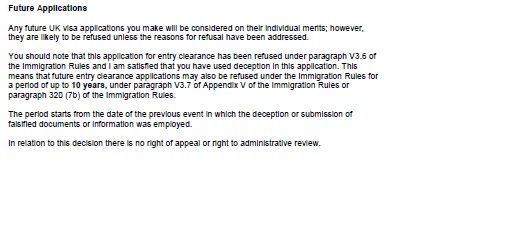Once again, a peek into the Immigration Rules of the United Kingdom which are publicly accessible on the official site will clear up all remaining issues.
First, let’s take a look at the refusal note; or rather, the small fragment we have which here is enough:
You should note that this application for entry clearance has been refused under paragraph V3.6 of the Immigration Rules and I am satisfied that you have used deception in this application.
Paragraph V3.6 of Appendix V reads:
V 3.6 An application will be refused where:
(a) false representations have been made or false documents or information have been submitted (whether or not material to the application, and whether or not to the applicant’s knowledge); or
(b) material facts have not been disclosed, in relation to their application or in order to obtain documents from the Secretary of State or a third party provided in support of their application.
In case you did not notice, the ECO/ECA also spelt it out for you: they accuse you of having used deception, i.e. false representations or materials. As user Gayot Fow mentions in many of their answers, the United Kingdom does not approve of deception being used in visa applications. (The former sentence is a somewhat mild British understatement.) A number of rules spell this out, for example paragraph A320:
Grounds on which entry clearance or leave to enter the United Kingdom is to be refused
[…]
(7A) where false representations have been made or false documents or information have been submitted (whether or not material to the application, and whether or not to the applicant’s knowledge), or material facts have not been disclosed, in relation to the application or in order to obtain documents from the Secretary of State or a third party required in support of the application.
(7B) where the applicant has previously breached the UK’s immigration laws (and was 18 or over at the time of his most recent breach) by:
(a–c) […]
(d) using Deception in an application for entry clearance, leave to enter or remain, or in order to obtain documents from the Secretary of State or a third party required in support of the application (whether successful or not);
unless the applicant:
(i) […]
(ii) used Deception in an application for entry clearance more than 10 years ago;
Maybe the corresponding sub-paragraph of Appendix V is even more relevant since that appendix is concerned with visitor visas:
Breaches of UK immigration laws
V 3.7 An application, except an application for an extension of stay as a visitor, will be refused if:
(a) the applicant previously breached UK immigration laws as described at V 3.9; and
(b) the application is made within the relevant re-entry ban time period in V 3.10 (which time period is relevant will depend on the manner in which the applicant left the UK).
V 3.8 […]
V 3.9 An applicant, when aged 18 years or over, breached the UK’s immigration laws:
(a–c) […]
(d) if deception was used in relation to an application or documents used in support of an application (whether successful or not).
V 3.10 The duration of a re-entry ban is as follows:
(a–e) […]
(f) 10 years used deception in an application for entry clearance (including a visit visa).
It spells out doom, even if you are not good at reading legalese: the ECO concluded your friend has been using deception in a visa application; therefore, visiting the UK is out of question for them for the next ten years. Full stop.
As the refusal notice says, there is no right of appeal. The rejection was based on the documents and information provided at the time of the application and no other time. Your friend will have put their signature somewhere, signing that all information was complete and accurate to the best of their knowledge. ‘Forgetting’ to mention a revoked visa was either incredibly stupid or deliberate (and doomed to fail) — and the ECO is required to think the latter. Thus, no hope and no chance.

